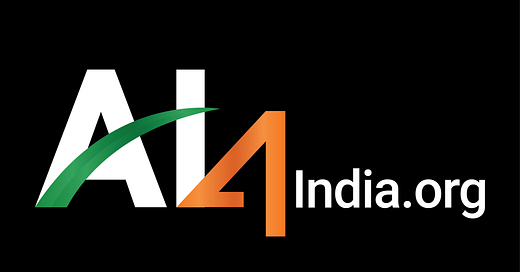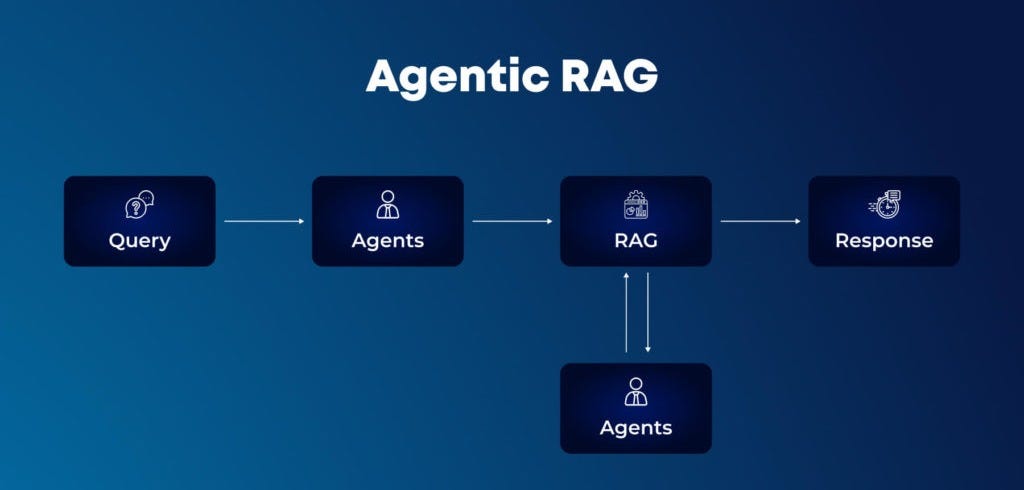Sovereign LLMs, Rural healthcare, Agentic adoption - AI at work across India
The AI4India Weekly #47
India’s AI journey is picking up serious momentum. This week, we bring you updates on the nearing milestone of shortlisting indigenous LLM teams under the India AI Mission—a key step toward building sovereign AI capabilities at scale. From strengthening compute infrastructure to fostering ethical AI governance through consultations with MeitY and UNESCO, the country is shaping a uniquely Indian AI narrative. Meanwhile, the tech frontier continues to shift globally, with Meta unveiling powerful new multimodal LLMs and a spotlight on Agentic RAG, a promising evolution in AI reasoning. We also look at how AI is transforming rural healthcare and why the smartest agents might actually be the simplest. Dive in to see how India is thinking big—and building smart.
India AI Mission Nears Key Milestone: LLM Teams to Be Shortlisted Soon
India’s flagship AI initiative is poised to take a transformative leap, with Union Minister Ashwini Vaishnav announcing that the assessment of applications for Large Language Models (LLMs) under the India AI Mission is in its final stages. Speaking at the launch of the Vinod Dham Center of Excellence for Semiconductors and Microelectronics at Delhi Technological University, the minister shared that in the coming weeks, shortlisted teams working on indigenous LLMs will be announced and awarded funding. This significant development is in line with the government’s earlier vision to develop an Indian AI platform within 18 months—enabling the country to build homegrown AI capabilities at scale.
Vaishnav also highlighted the substantial infrastructure being built to support India’s AI ambitions. A total of 14,000 GPUs have already been procured as part of the Mission, with the second phase of the panel process underway to ensure expanded computing access for startups and researchers. These efforts aim to strengthen India's AI ecosystem not only through cutting-edge research and indigenous model development but also by enabling wider access to high-end compute. The establishment of the Vinod Dham Center at DTU further underscores the government’s commitment to fostering innovation in critical tech domains, including semiconductors and AI.
AI Revolutionizing Healthcare in Rural India
Artificial intelligence is making significant strides in transforming healthcare delivery in India's rural regions. Innovative health-tech startups are leveraging AI to bridge gaps in medical services, ensuring that even the most remote villages have access to quality care. For instance, Qure.ai has developed an AI-enabled stroke care platform that allows clinicians to remotely assess emergency cases, facilitating timely and accurate treatment decisions. This technology has been effectively utilized in hospitals in smaller towns, such as Tezpur in Assam, demonstrating its potential to enhance healthcare accessibility nationwide.
Additionally, organizations like Wadhwani AI are deploying AI solutions to address critical health challenges. In collaboration with the Indian government, they have launched clinical decision-support systems that assist physicians and frontline workers in making faster and more accurate diagnoses. These systems are currently being used for over four million consultations monthly, significantly improving patient outcomes. Such initiatives exemplify how AI is not only enhancing the efficiency of healthcare delivery but also democratizing access to first-world medical services for India's underserved rural populations.
Shaping India’s Ethical AI Future: MeitY and UNESCO Host Key Consultation in Hyderabad
The Ministry of Electronics and Information Technology (MeitY) and UNESCO are set to host the third regional consultation on India’s AI Readiness Assessment Methodology (RAM) on Tuesday at T-Works, Hyderabad. With Ikigai Law as the implementing partner, the session will bring together stakeholders from government, academia, and industry to contribute to a comprehensive, India-specific AI policy framework. A special fireside chat featuring Abhishek Singh, CEO of the IndiaAI Mission and Additional Secretary at MeitY, will delve into the evolving vision of the IndiaAI Mission. The event will also host a high-level panel on “Shaping Ethics in AI Governance,” featuring senior officials from the Office of the Principal Scientific Advisor, Amrita University, UNESCO, and the Government of Telangana.
Participants will engage in thematic breakout discussions on governance, infrastructure, workforce readiness, and use cases—offering valuable inputs to strengthen India’s ethical AI ecosystem. This Hyderabad meet marks the third in a series of five consultations, following similar efforts in New Delhi and Bengaluru. The initiative aligns closely with the broader INDIAai Mission, which is being implemented with an outlay exceeding ₹10,000 crore. With a strong emphasis on the “Safe and Trusted AI” pillar, the consultations aim to refine tools and frameworks that will empower innovators while ensuring responsible, accountable AI development in India.
Meta Unveils Llama 4 Scout & Maverick: Multimodal Powerhouses with Open Access
Meta has launched two new open-weight multimodal models—Llama 4 Scout and Llama 4 Maverick—marking a major step forward in the open-source LLM space. Built on a mixture-of-experts (MoE) architecture, these models represent Meta’s most powerful and efficient offerings to date. Scout, with 17 billion active parameters and 16 experts, is optimized for single-GPU use and features an unprecedented 10 million-token context window. Maverick, also with 17 billion active parameters but backed by 128 experts and a total parameter count of 400 billion, is designed for high-performance tasks such as complex reasoning and code generation. Both models outperform major contenders like GPT-4o, Gemini 2.0, and Mistral 3.1 across several benchmarks, and are already integrated into Meta’s AI ecosystem on WhatsApp, Messenger, Instagram Direct, and the Meta AI website.
Behind these releases lies Llama 4 Behemoth, a two-trillion parameter teacher model still in training, which was used to distill Scout and Maverick via advanced codistillation methods. With innovations like interleaved attention layers, inference-time temperature scaling, and a hybrid fine-tuning approach combining SFT, RL, and DPO, the new Llamas are built for versatility and depth. Meta emphasized the importance of openness, releasing the models under permissive terms via Llama.com and Hugging Face. With more insights expected at LlamaCon on April 29 and a dedicated reasoning model in the pipeline, Meta is doubling down on its ambition to lead the open-source frontier of multimodal AI.
Read More
AI Agents: Why Less Capability Might Be the Smarter Bet
As the AI world races ahead with ever more ambitious agent demos, a growing counter-narrative is emerging: users don’t want flashy—they want dependable. A recent commentary capturing widespread sentiment emphasized that users are often more comfortable with tools that are transparent, consistent, and easy to control. Booking flights, often touted as the ‘Hello World’ of AI agent demos, illustrates this perfectly. Existing tools like Google Flights offer a near-perfect user experience—predictable, clear, and user-controlled. Replacing that with a black-box AI experience risks introducing complexity and uncertainty where none is needed.
Examples like Cursor and Devin show how user trust can quickly erode when complexity overtakes clarity. Cursor initially gained popularity due to its simple, reversible actions—but as it evolved, incidents like unexpected data loss highlighted how even technically advanced tools can falter without thoughtful UX. In contrast, Devin’s fully autonomous approach, backed by millions in funding, faced backlash for being too unpredictable and hard to follow. The lesson is clear: for AI agents to gain lasting traction, they must focus not on doing everything, but on doing a few things exceptionally well—with a relentless emphasis on reliability, simplicity, and user agency.
India Emerges as Global Leader in Agentic AI Adoption: Deloitte Report
India is leading the charge in adopting Agentic AI—AI systems capable of autonomous decision-making—with a new Deloitte report highlighting the country’s remarkable momentum in this cutting-edge field. According to the report, 92% of Indian enterprises have either implemented or are exploring Agentic AI solutions, far ahead of the global average of 65%. This places India at the forefront of next-generation AI adoption, with businesses particularly leveraging these systems to improve customer engagement, automate complex workflows, and enhance decision-making.
The report also underscores India’s favorable ecosystem for AI integration, including a robust startup culture, strong government backing, and increasing availability of AI talent. Sectors such as financial services, manufacturing, and healthcare are leading adopters, using Agentic AI to not only boost operational efficiency but also unlock new growth opportunities. Deloitte’s findings reflect the broader narrative of India’s tech-forward strategy—one that’s now extending into autonomous, intelligent systems poised to reshape industries.
AI Buzz of the Week: Agentic RAG – Smarter Retrieval Meets Autonomous Reasoning
This week’s AI spotlight is on Agentic RAG—a powerful evolution of Retrieval-Augmented Generation (RAG) that’s pushing the boundaries of what AI can do. While traditional RAG systems retrieve information from external sources to support more accurate responses, Agentic RAG goes a step further. It incorporates autonomous agent-like behavior, enabling AI models not just to retrieve and generate, but to plan, reason, and act through complex, multi-step workflows. Think of it as giving AI a “thought process” to independently seek out, synthesize, and apply information across tasks—ideal for use cases like research assistants, financial modeling, or legal summarization.
According to IBM, Agentic RAG systems empower AI to access multiple sources, iteratively refine its understanding, and make decisions on-the-go—much like a human would when solving a problem. These systems use agents to break down tasks, manage dependencies, and generate more reliable and context-rich outputs. With growing interest in building trustworthy, efficient, and scalable AI applications, Agentic RAG is emerging as a key innovation in the future of generative AI, making AI not just more informed—but more intelligent in how it acts.
#DataDaan - Donate for a Digital India
Aligned with the IndiaAI Mission and MeitY’s efforts to ensure the availability of AI-usable data, the #DataDaan campaign by AI4India is now live on DataDaan.org. This initiative invites individuals and organizations to contribute valuable datasets, enriching India’s AI ecosystem and driving innovation across sectors. The platform provides a streamlined process for data contribution, ensuring responsible and impactful AI development. Visit DataDaan.org to explore the initiative and be part of this transformative effort.
NOTE: The views expressed by the authors are their own. AI4India as a forum does not endorse any comments on specific brands, products, platforms or companies.
Join our AI4India.org forum to be a part of the AI revolution in India by visiting our site now.
Follow us on our X and LinkedIn to receive interesting updates and analysis of AI-related news









